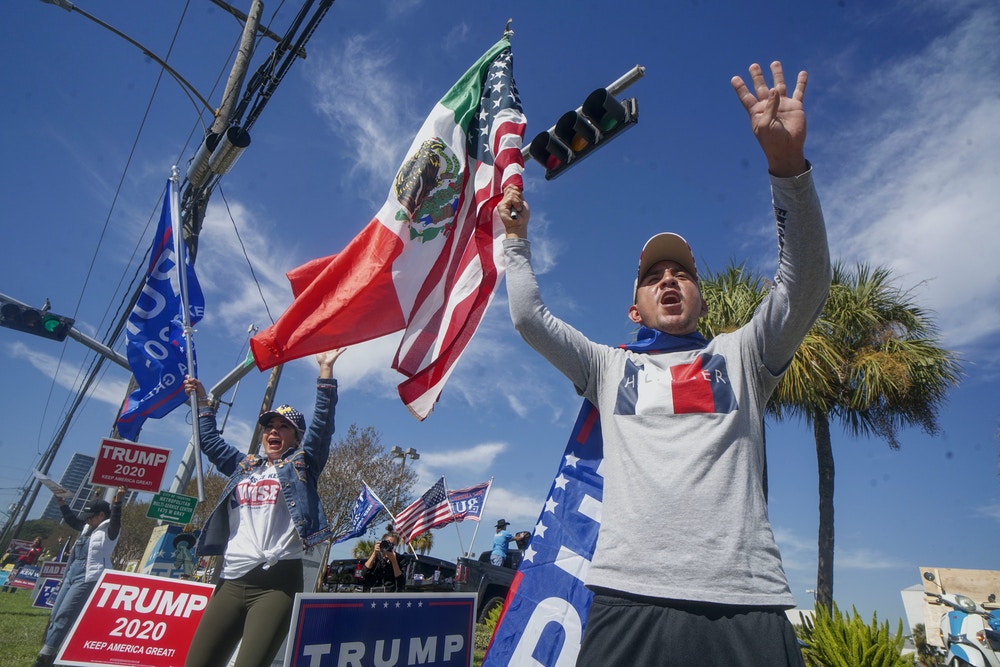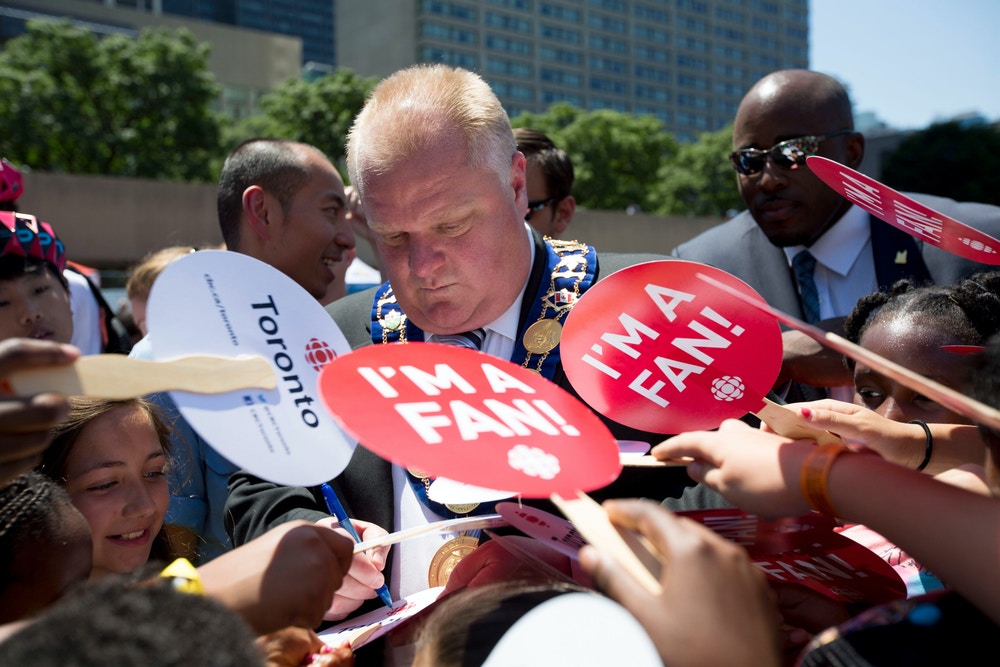In 2010, the city of Toronto, one of the most ethnically diverse places in the world and a supposed bastion of liberalism, elected a man widely considered to be a racist as its mayor. Rob Ford was a vulgar and incoherent oaf, a former city councilor who clashed with his colleagues in public and went on racist tirades against seemingly every minority group. But when Ford successfully ran for office, it wasn’t on the wave of a white backlash against diversity, as one might have expected. Instead it was immigrants and minorities, the very people Ford was supposedly insulting, who helped power his run. Not only that, for all his unapologetic crudity — probably even because of it — they loved him.
“He’s drug-addled, overweight and uneducated — yet he’s the mayor. In this against-all-odds success story, Ford is the anti-hero. He says things that the disenfranchised wish they could say,” noted a 2014 magazine profile in Toronto Life about the mayor’s surprising popularity with minorities.
“Nobody sticks up for people like I do, whatever the race,” an inebriated Ford was once recorded saying, before, somewhat contradictorily, launching into a string of racial slurs and adding, “I’m the most racist guy around. I’m the mayor of Toronto.”
I was living in Toronto at the time and witnessed Ford’s rise. While the media fell over themselves to brand him as a racist, a title which he sort of embraced, Ford shocked them by drawing his most enthusiastic support from the immigrant-heavy, working-class suburbs where he was considered something of a folk hero. Many of my friends were supporters. To this day, several still fondly recall impromptu marijuana-smoking sessions with the then-mayor after running into him at gas stations or outside fast-food restaurants in the city. Although Ford was born into a wealthy family, people overlooked that, along with his hard-drug use, constant slurs, and general incompetence, to embrace him as an accessible everyman. (For the record: I did not share this sentiment.)
The more the media condemned him, the better Ford looked in the eyes of his supporters. Ford didn’t offer much in terms of policies or good governance, but his outlandish personality represented an “upraised middle finger,” as Toronto Life put it, against what many people felt was an arrogant, hypocritical, and morally self-satisfied establishment.
Photo: Carlos Osorio/Toronto Star/Getty Images
I couldn’t help but recall the story of Ford, who passed away from cancer four years ago, while watching reactions to exit polls from the 2020 U.S. presidential election. To the shock of many, the polls appeared to show increased nonwhite support for President Donald Trump. Such polls can be inaccurate and it’s worth waiting to draw firm conclusions. The current numbers, however, suggest that after years of what many viewed as Trump’s obvious racism, he drew more Black and Latino voters in this race than he did in his 2016 campaign against Hillary Clinton. The data, collected by Edison Research and published in the New York Times, also suggests that, in addition to marginal increases among Latinos and Black people, Trump drew around a third of all Asian voters — certainly enough to undermine the claim that his politics appeal solely to a narrow group of white nationalists.
Given how much he seemed to embody the definitive racist candidate, it’s worth asking how Trump managed to even marginally increase his appeal to nonwhite voters.
Joe Biden still won strong majorities across all nonwhite demographics, as Democratic politicians consistently have for many years. In key urban areas like Philadelphia, Milwaukee, Atlanta, and Phoenix, voters of color seemed to be decisive in pushing Biden to a likely victory in the election.
Yet given how much Trump seemed to embody the definitive racist candidate, and how strongly progressives have been betting on long-term demographic change as a point in their favor, it’s worth asking how Trump managed to even marginally increase his appeal to nonwhite voters after four years of reckless and divisive politics. To put it another way: How did a seemingly open racist manage to maintain and even increase his support among Black, Latino, and other voters of color?
One reason may be that, for a lot of nonwhite voters, Trump simply did not fit their definition of racism. The understanding of what constitutes racism is often different across class lines, especially when we’re talking about very ambiguous concepts like “tropes” and “dogwhistles.” Even when Trump makes what seem like obviously racially coded claims about immigration or crime, it’s not clear that people of color feel he’s talking about them personally. Trump seems glad to embrace Black and Latino supporters, for example, as long as they seem to fit with a certain image of success and conservatism.
Racial categories, of course, are complex, and clear racial voting blocs are a myth. Letting go of the idea that immigrants or people of color represent any type of political monolithic might itself be progress. Trump, for instance, appears to have benefited greatly from Cuban American support in Florida’s Miami-Dade County, a community that is coded as Latino, frequently identifies as white, and seems to have prioritized its anti-socialist politics above much else.
Liberal politicians, for their part, have relished in using accusations of racism to establish their own bona fides as the true friends of people of color — and deserving of those demographics’ reflexive political support. It doesn’t always work out. Many people of all backgrounds feel disillusionment with a ruling establishment that is incapable improving their lives and who they believe are sneering down at them culturally — a stereotype the right-wing media pushes relentlessly. The satisfaction of electing an outlandish candidate just to watch them freak out might just seem worth it.

Photo: Sandy Huffaker/Getty Images
Like Rob Ford years ago, Trump gleefully employs almost every racial trope in the book, regularly stomping on the delicate rhetorical pieties of elite discourse in America. His behavior seems to have alienated some white voters, particularly among the college-educated, who are locked in a political and cultural death match with noncollege-educated white people. But Trump’s general behavior does not seem to have harmed him in the same way with nonwhite voters.
“Perceptions of Trump as racist seem to be a core driving force pushing whites toward the Democrats. Why would the opposite pattern be holding among minority voters — i.e. the very people the president is purportedly being racist against?” wrote Musa al-Gharbi, a professor of sociology at Columbia University, in a prescient article for NBC News published just before the election. “It may be that many minority voters simply do not view some of his controversial comments and policies as racist. Too often, scholars try to test whether something is racist by looking exclusively at whether the rhetoric or proposals they disagree with resonate with whites. They frequently don’t even bother to test whether they might appeal to minorities, as well.”
“Yet when they do,” al-Gharbi wrote, “the results tend to be surprising.”
Conservative rhetoric about issues like immigration, policing, and crime often appears to resonate with Black and Latino voters at least as much as conservative white voters — sometimes they even receive it more warmly. Both groups, along with a significant chunk of Asian Americans, also lean conservative on some issues, particularly religion, compared with white progressives who make up much of the Democratic voting coalition. All this, though, has not translated into majority support for the Republican Party — at least not yet — but it should be a serious warning sign to Democrats about taking nonwhite voters for granted.
For Democratic politicians, it makes obvious sense to define “racism” in whatever way seems to give them an advantage over Republicans.
Earlier this year, al-Gharbi wrote another article about the excessive comfort liberal elites have developed about their role in defining the politics of race and racism in America: The elites assume that they are the ones who defend people of color against racism. The way that some liberals have allegedly employed the subject to undermine class-based appeals is only part of the story, al-Gharbi argued in the piece, appropriately titled, “Who Gets to Define What’s Racist?”
“White elites — who play an outsized role in defining racism in academia, the media, and the broader culture — instead seem to define ‘racism’ in ways that are congenial to their own preferences and priorities,” al-Gharbi wrote. “Rather than actually dismantling white supremacy or meaningfully empowering people of color, efforts often seem to be oriented towards consolidating social and cultural capital in the hands of the ‘good’ whites.”
In electoral politics, the picture tends to be more muddled, on account of several factors. For instance, it is clear that the charges against Trump as a racist are not just coming from educated white elites: Many of the activists, politicians, and ordinary people sounding the alarm about the president are themselves people of color from nonelite backgrounds.
Yet there is a logic to al-Gharbi’s critique. For Democratic politicians, flush with self-confidence on these issues, it makes obvious sense to define “racism” in whatever way seems to give them an advantage over Republicans. This seems to be part of the impetus behind constantly embracing new renovations of language when it comes to issues involving people of color, even when the people of color in question don’t always seem to share the same perspective.

Photo: Kena Betancur/AFP/Getty Images
In deeming themselves the arbiters of what is and isn’t racist, liberals might risk politicizing the accusation and taking power away from people of color — the people who actually suffer from discrimination — thus reducing a truly serious issue into a political weapon to settle scores with other elites. This type of politicized use of racism accusations risks harming minorities by draining the power of a concept that they sometimes really do need to defend their rights and dignity from assault. To some extent, you can look for an example of the same phenomenon when it comes to how the accusation of anti-Semitism is used to deflect legitimate critiques of U.S. foreign policy toward Israel.
It is difficult to know what motivated the people of color who supported Trump this election. It’s possible, for example, that his strongman appeal resonated with men for whom gender had more salience than racial identity in their voting decisions. But it is clear that Democrats have the opportunity to counter any such cultural influences with policies that would make a material difference in people’s lives.
The thin gruel of symbolic racial identity politics offered by the Democrats is not doing much to help minorities, and many of them are not going to keep accepting it forever.
The thin gruel of symbolic racial identity politics offered by the Democrats is not doing much to help minorities, and many of them are not going to keep accepting it forever. Measures like an increased minimum wage and Medicare for All would reduce racial inequalities in significant, tangible ways while also appealing to the white working class, who would benefit from the same measures. Instead, for years, the Democrats sidestepped the more ambitious of these universal economic programs in favor of identity-based appeals that they hope will do just enough to get them through the gate. That approach is showing serious morbid symptoms at this point. The Democrats may have dodged the bullet this time, just narrowly, but liberals should consider the position they could have be in today were they not running against a proudly incompetent opponent presiding over a historic public health and economic disaster.
None of this is to say that Democrats should throw out the issues and values that they believe define them as a party. The effort to fight racial injustice itself comes from a good place and should not be abandoned. And, in my own humble opinion, Trump is indeed a racist. This is evidenced not only by his words, but by the cruelty and indifference he has often shown to nonwhite people in the U.S. and abroad. People from racialized backgrounds who choose to ignore this are making a huge mistake. But American liberalism also needs to walk and chew gum at the same time: supporting economic programs for universal uplift, while upholding the fact that people of all backgrounds in American society have equal rights and dignity.
It might be helpful to democratize our attitude toward racial justice — especially in opposition to some elite liberals who are trying to politicize anti-racism for their own purposes. If racism were treated as a mistake that people make and can be rectified, not a moralistic label that defines them, then it could take some of the heat out of the endless culture war can lead possible allies to retreat into a defensive posture that sometimes obscures shared economic interests. Mercy and a recognition of universal human frailty are good sentiments to bring forward to our discussion of social ills like racism and misogyny.
When Ford died in 2016, thousands of people of all backgrounds marched in the streets in a genuinely emotional outpouring of grief for an incompetent, foul-mouthed, crack-smoking politician who was also, according to the public record, a racist. Ford, however, was at the end of the day just the mayor of a city. Trump, on the other hand, was elected to the most powerful job in the world — the president of an entire country in which millions of people, not a few of them minorities, are clearly clamoring for a strongman.
The unsettling results of this election should dispel any assumption that demographic change will inevitably rescue us from such a fate. Despite the likelihood of Trump’s defeat in the presidential election, now more than ever, the liberal establishment looks feeble in the face of grave national challenges. There is still an opportunity to figure things out and rework a policy approach that appeals to a sustainable majority coalition of Americans. If this close election tells us anything though, it’s that time is running out.
Murtaza Hussain | Radio Free (2020-11-06T19:17:30+00:00) Nonwhite Voters Are Not Immune to the Appeal of Right-Wing Populism. Retrieved from https://www.radiofree.org/2020/11/06/nonwhite-voters-are-not-immune-to-the-appeal-of-right-wing-populism/
Please log in to upload a file.
There are no updates yet.
Click the Upload button above to add an update.
